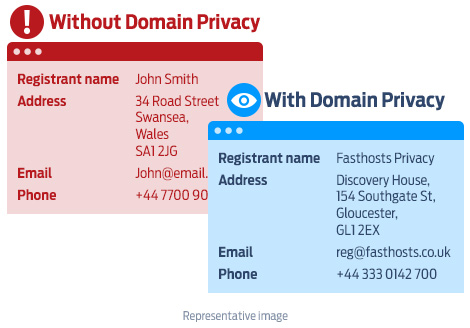Domain Privacy Protection
If you are new to websites, hosting and domain names, you may be unfamiliar with some of the additional services that registrars offer when you purchase a domain. One of most important service is domain privacy protection.
So, what is domain privacy protection?

When register a domain name you are required to submit all the details like your name, business and other contact details. Once domain name registered these information will store in a database called WHOIS directory. From this directory anyone can search who is the owner and all submitted details for a domain name.
But when you enable domain privacy protection for a domain name it will not return your personal information and masked with service provider information. Mask only applies when someone query your domain name through WHOIS directory and your original information can view only by visiting your control panel.
Why I need to consider about domain privacy protection?
Here major reasons why you need to consider about domain privacy protection.
1. Protect your personal data
There is enough data contains in WHOIS directory for a skilled or tenacious thief to start causing problems, and enable them to dig deeper into your personal data for the purpose of identity theft. Using domain privacy protection covers your information.
2. Stop Unwanted Solicitations
Displaying your personal information is an open invitation for telemarketers, sales people, spammers and other data collectors. When these people got the personal information, continues spam emails, phone calls and many advertisements will fill your email box and SMS storage.
One major problem is when your domain name about to expire, scammers start to contact your saying domain name renewal services. Actually they will not renew your domain name, but transfer your domain name without your knowledge. If you have any issue like that, contact your registrar anytime.
3. Protect Your Email Address
When you use private domain registration, your registrar typically creates an alias or unique email address that is used in place of your own within the WHOIS database. This email address does not remain constant and will be updated fairly often. This is done to keep away unsolicited email from spammers.
4. Prevent Domain Hijacking
Domain hijacking used to be a much larger issue. Thanks to domain transfers being locked by default by most registrars after acquisition, it’s not as easy as it used to be. With this lock set, no one is able to transfer your domain away from you unless they somehow manage to get access to your domain registrar account and email.
Hiding your personal information adds one more hurdle to the process, making it extremely difficult for someone to harvest the data and attempt to gain access to your account.
While privacy protection is enabled, the domain transfer authorization email will be sent to the dummy email address listed rather than the registrant’s email address, making the transfer fail if not authorized. Most (if not all) dummy email addresses provided by registrars do NOT forward to the registrant’s email address.
Keep in mind that you cannot get privacy protection for all domain name extensions. Currently it is available for major top level domain names only.


